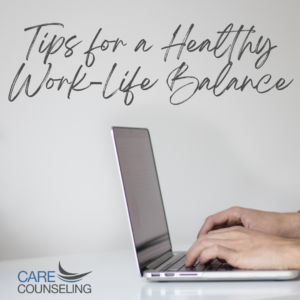Tips for a Healthy Work-Life Balance
 In today’s fast-paced and demanding world, achieving a healthy work-life balance can seem like an elusive goal. Juggling career responsibilities, personal life, and self-care can be a challenge. However, it’s essential to prioritize work-life balance for your overall well-being and happiness.
In today’s fast-paced and demanding world, achieving a healthy work-life balance can seem like an elusive goal. Juggling career responsibilities, personal life, and self-care can be a challenge. However, it’s essential to prioritize work-life balance for your overall well-being and happiness.
Why Work-Life Balance Matters
Work-life balance refers to the equilibrium between the demands of your professional life and the pursuits of your personal life. Achieving a healthy work-life balance is vital for several reasons:
- Mental Health: Maintaining balance reduces stress and burnout, contributing to better mental health. It allows for relaxation and rejuvenation, preventing the negative impacts of chronic stress and mental fatigue.
- Physical Health: Overworking and neglecting personal life can lead to physical health issues. A balanced life allows time for exercise, nutritious eating, and sufficient sleep.
- Quality Relationships: Work-life balance enhances personal relationships. It provides time to connect with family and friends, fostering stronger bonds and emotional support.
- Increased Productivity: Balanced individuals are more productive at work. They are more focused, motivated, and creative, which can benefit their professional lives.
- Personal Fulfillment: Finding time for hobbies, passions, and self-care contributes to personal fulfillment and a sense of happiness and contentment.
Practical Tips for Achieving Work-Life Balance
Achieving work-life balance requires conscious effort and prioritization. Here are some practical tips to help you find harmony in your life:
- Set Boundaries
Establish clear boundaries between work and personal life. Define specific working hours and stick to them. When your workday ends, avoid checking emails or taking work-related calls.
- Prioritize Self-Care
Prioritize self-care activities that rejuvenate your mind and body. This can include exercise, meditation, hobbies, or simply taking time to relax and unwind.
- Manage Time Effectively
Learn time management skills to increase efficiency in both your professional and personal life. Prioritize tasks, set realistic goals, and use productivity tools to stay organized.
- Unplug from Technology
Constant connectivity through smartphones and other devices can blur the lines between work and personal life. Designate specific times for unplugging and taking a break from screens.
- Learn to Say No
Overcommitting can lead to burnout and stress. Learn to say no to additional work or personal responsibilities when you feel stretched too thin.
- Plan Regular Breaks
Incorporate regular breaks into your workday to recharge and refocus. Short breaks can improve productivity and reduce stress.
- Set Realistic Expectations
Set realistic expectations for yourself and your career. Avoid aiming for perfection in every aspect of life, as this can lead to unnecessary stress.
- Delegate and Share Responsibilities
In both your professional and personal life, delegate tasks and share responsibilities with others. Don’t hesitate to ask for help when needed.
- Create a Supportive Work Environment
If possible, seek a work environment that supports work-life balance. Some employers offer flexible work arrangements, such as remote work or flexible hours.
- Make Time for Loved Ones
Make quality time for loved ones and friends. Personal relationships play a significant role in overall well-being, so nurture and cherish them.
- Engage in Hobbies and Passions
Devote time to hobbies and passions that bring you joy. Pursuing interests outside of work can provide a sense of fulfillment and relaxation.
- Set Goals and Priorities
Set clear goals and priorities for both your personal and professional life. This can help you make decisions that align with your values and aspirations.
- Review and Reflect
Regularly review your work-life balance and reflect on whether you’re meeting your goals. Adjust as needed to maintain balance.
- Seek Professional Help
If you find it challenging to achieve work-life balance due to stress or burnout, consider seeking support from a counselor or therapist. They can provide valuable coping strategies and emotional guidance.
- Embrace Flexibility
Finally, remember that work-life balance is not a rigid equation. It’s about finding what works best for you in your unique circumstances. Be flexible and adapt to the evolving demands of both your personal and professional life.
Achieving a healthy work-life balance is a crucial aspect of leading a fulfilling and happy life. By setting boundaries, prioritizing self-care, managing time effectively, and nurturing personal relationships, you can find the harmony needed to thrive in both your professional and personal life. Remember that balance is an ongoing pursuit, and it’s essential to make it a priority for your well-being and happiness.



























